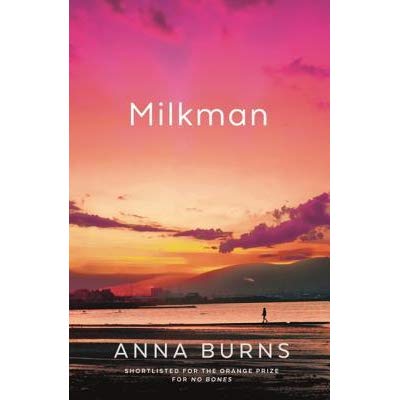Milkman by Anna Burns
 This book was strange and spellbinding and tense and illuminating in ways unlike anything I’ve read recently. Its most prominent features are its stream-of-consciousness-adjacent style and its intense obliqueness (although this is really the characters being oblique, not the novel itself). A plot summary would tell you it’s the story of an 18-year-old woman in Belfast in the 70s who is pursued by a powerful paramilitary figure in ways the culture makes it impossible to resist or escape. And that is essential to the book, but does nothing to identify what’s so incredible about it.
This book was strange and spellbinding and tense and illuminating in ways unlike anything I’ve read recently. Its most prominent features are its stream-of-consciousness-adjacent style and its intense obliqueness (although this is really the characters being oblique, not the novel itself). A plot summary would tell you it’s the story of an 18-year-old woman in Belfast in the 70s who is pursued by a powerful paramilitary figure in ways the culture makes it impossible to resist or escape. And that is essential to the book, but does nothing to identify what’s so incredible about it.
We are so deeply inside the psychology of both the young woman and the local culture that I never once had the urge to shake her and tell her to just stand up for herself–it would obviously have been impossible for her, and the book made that extremely clear through its language and incisive descriptions, without ever explaining anything. A central feature of the novel its its refusal to name things, perhaps out of utter fear of the power of words or an inability to carry on while explicitly acknowledging what’s actually happening. There is no mention of Britain or Ireland, theIRA, protestants or catholics; only “the wrong religion,” and people from “over the road” or “over the water.” Nobody is known by a name; the narrator is simply middle sister, her stalked The Milkman (not an actual milkman; the book has another character known as Real Milkman). There is longest friend, maybe-boyfriend, tablets, girl, first brother-in-law, wee sisters, and so on. A cemetery is “the usual place,” a treacherous neighborhood “the ten minute area” (how long it takes to walk across it”. There is a group of early feminists, “the issue women.”
Nobody goes to the hospital because it would brand you as an informer; you only call the police if you intend to shoot them. There are two men in charge of what you are and are not allowed to name your children–any name too “over the water” is forbidden. You must not eat the wrong kind of butter, or drink “the tea of betrayal.” It never feels contrived or difficult to follow. It all makes sense, so much sense, against all odds.
Postscript: I couldn’t tell you what it is, but I often detect a specific sensibility in works by Irish writers. I’ve sometimes wondered what you’d get from someone with James Joyce’s talent and aesthetic sense who was a woman. And I’ve also detected it in the work of Eimar McBride. In my work as an editor I recently selected a story by an Irish writer that had a distinctly Irish feel to it. Maybe one day I’ll manage to articulate what it is. In the mean time, I will continue to enjoy it.